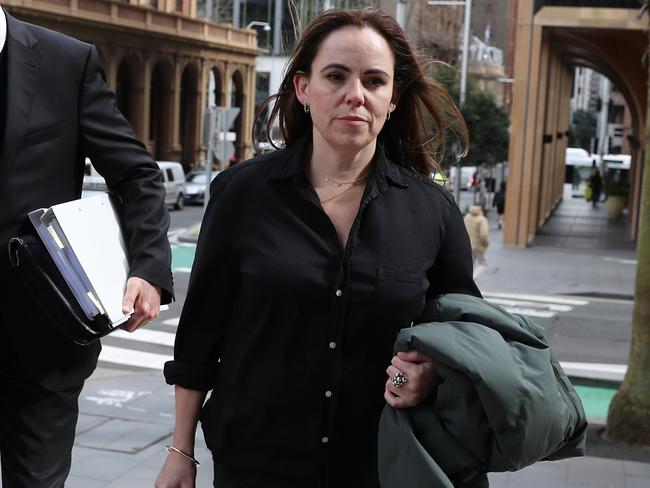Ownership Matters boss Dean Paatsch demands to view hidden Super Retail court documents
The nation’s most powerful and influential corporate governance adviser, Dean Paatsch, has accused the Federal Court of ‘running a protection racket’ for companies and directors.

The nation’s most influential corporate governance adviser, Ownership Matters boss Dean Paatsch, is demanding to view hidden court documents linked to the Super Retail Group workplace scandal and legal battle, arguing shareholders should know the true nature of the legal and financial threats facing the retailer as well as any governance deficiencies on the board led by chair Sally Pitkin.
The Australian can reveal it was Mr Paatsch and Ownership Matters that made a submission to the Federal Court to view the statement of claim made by sacked Super Retail chief legal officer Rebecca Farrell, which was kept confidential in court last week. Justice John Halley spoke of a document request from an “investor consultancy organisation”.
“It’s interesting because it involves allegations about the credibility of the company’s whistleblower regime and those things may not be material to share price, but they’re material to the way in which the company conducts itself generally in risk management,” Mr Paatsch told The Australian.
“At the very least, it suggests that there are questions that the board would respond to, particularly given that board members themselves (chair Pitkin and director Annabelle Chaplain) are named in the document.
“We know when we apply for court documents that they will be contested allegations. We are quite comfortable seeing through what might be spurious and what is simply an allegation and the independent verification, but occasionally you will find absolute gems which pose questions that the board and management ought to answer.
“So it’s on the public record. I want to know about it. If there’s nothing to see here, I will determine that for myself.”

Mr Paatsch, one of the founders of corporate governance advisory in Australia, has also aimed his guns at the Federal Court’s recent rule change denying non-parties public access to crucial court documents such as the statement of claim until there is a directions hearing – which can take months.
Mr Paatsch described the ruling as “curious”, saying courts were “running a protection racket” for companies and the “hurt feelings” of directors that flies in the face of the fundamental concept of “open justice”.
Mr Paatsch, who has the ears of some of the nation’s largest super funds and fund managers, is closely following the court case and scandal now gripping Super Retail, flowing from claims from whistleblowers including Ms Farrell about allegedly improper workplace behaviours, bullying, harassment – and that chief executive Anthony Heraghty was having a secret affair with his then head of human resources, Jane Kelly.
Alongside the media, Ownership Matters made a submission to view Ms Farrell’s statement of claim, where it is believed she details the events leading to the scandal, the inner workings of Super Retail’s whistleblower policy and any corporate governance claims or failings concerning the board, chair Ms Pitkin and the head of the risk committee, Ms Chaplain.
“I’ve applied for hundreds of court documents in the ordinary course of business, and one of the reasons why we do that is any sort of litigation is a matter of public record that can inform investors about the confidence and integrity of the board and management,” Mr Paatsch said.
Concerning the allegation of an affair, he said: “I’m totally OK with working out what is maybe a spicy but unverifiable claim and looking through it, and so it is a concern to me that the Federal Court is imposing this blanket ban (of documents) which may be useful to investors without any overwhelming public interest in the suppression itself.”
Some of the claims are being made by Ms Farrell and her lawyers, Harmers.
Super Retail chairman Ms Pitkin, a veteran boardroom director who has also sat on the boards of Link, Star Entertainment and Billabong International, has also been named as a respondent in the looming case before the Federal Court that is likely to reveal a string of scandalous claims against the retailer, whose chains include Rebel, Supercheap Auto, Macpac and BCF. According to Federal Court documents, Super Retail non-executive director Annabelle Chaplain, a former banker and director of Seven Group, has also been named as a respondent to the court action launched by Ms Farrell’s lawyers. Ms Chaplain is chair of the Super Retail board risk and sustainability committee.

Mr Heraghty, Ms Pitkin and Ms Chaplain were unavailable for comment. A spokesman for Super Retail declined to comment.
The allegations became public in April when Super Retail issued a statement to the ASX revealing it was subject to the claims and could face a legal and damages bill of $30m to $50m.
But for now Ms Farrell’s statement of claim is being kept from non-parties, such as the media and the public, as no directions hearing has been set and the courts are dealing with a separate but related argument that when Ms Farrell’s employment was terminated in May she reached a settlement with Super Retail that her lawyers argue has not been fulfilled by the retailer.
Mr Paatsch wants to see those claims for himself as he forms a view about the performance of the Super Retail board and its whistleblower policy.
“From our perspective the public access to court documents at the earliest instance is an important resource for investors, so that they can inform themselves about the trust and confidence of management,” Mr Paatsch said.
He argued the early release of these documents shouldn’t affect the share price.
“By its nature, it is very rarely material to stock price. And that is something that’s really important here, because if it were material, if there were allegations in there (Ms Farrell’s statement of claim) that were true and that would affect the stock price, well then the company itself would be required to issue a release. So by its very nature, the suppression of court documents is suppressing documents that are not material to stock price … Jurisdictions around the world have the default premise of open justice, that anything in open court will be available for everyone. “The Federal Court’s position is curious, and the only thing that I can discern is that they seem to be placing weight on protecting the interest of the reputations of directors, or in some strange way, the reputation of the company.”



